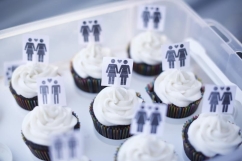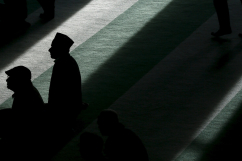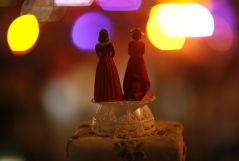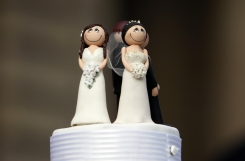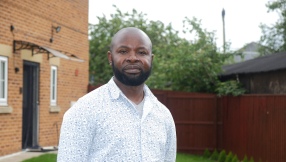Steve Chalke's Oasis Church has launched an 'Inclusivity Charter' it says is "a new initiative which has been created to support churches seeking to be inclusive of Lesbian, Gay, Bisexual and Transgender people". It "gives Christian congregations and communities searching for a proactive and public way to show that they are inclusive of the LGBT community a tool to do so".
Chalke himself refers to research about the poor mental health of LGBT people, saying this should come as no surprise to the Church. "Human beings are created for intimacy, and Christians believe that intimacy is found in community. By excluding LGBT people from their communities the Church in the UK and around the world is on the wrong side of what is a significant human rights issue. It is time to rethink our whole approach.
"I call on responsible Church leaders to re-evaluate their attitude and work to recognise and sanctify faithful, monogamous, same-sex relationships. This could be a cornerstone for building positive mental health in the gay community."
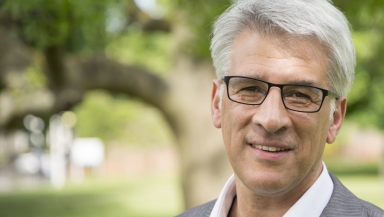
The seven points of the charter include guarantees that people can be open about their sexuality and gender identity, that Oasis will offer marriage to couples regardless of sexuality and gender identity and that these factors won't be considered when roles in the church are being decided.
At one level, there's nothing new about this. Oasis' commitment to 'inclusivity' on the same-sex marriage issue is well known and it has been on the path toward registering its building for the purpose for some time. Its charter is offered as a statement of its own position and a helpful contribution to other churches that might be going down the same path.
However, there are two factors that make it a little more interesting. One is that Oasis is a high-profile church attached to an organisation that has had a huge impact for good, and Chalke himself is a widely-respected pastor who still claims the 'evangelical' label. Another is that he is a Baptist minister, and the Baptist Union of Great Britain is not in a happy place on this issue.
On the first, reactions to the Open Church Charter have demonstrated the polarising nature of the debate on human sexuality. Some have lamented his departure from 'Bible-believing' orthodoxy, evidently unconvinced by his claim on Premier Radio yesterday that the move was "not because we're liberal, it's not because we're light on the Bible, it's because we take the Bible very seriously". Others have welcomed Oasis' stance. There is not much in the way of a polite agreement to differ, because of the perception that something absolutely fundamental is at stake – belief in the Bible itself, the foundation of evangelical unity. The view that it simply isn't possible to interpret the Bible in a way that permits same-sex relationships is deeply entrenched in most evangelical thinking.
However, Oasis' charter is also a challenge to Chalke's Baptist denomination. At its Council meeting in March, BUGB reaffirmed its belief that marriage was a union between one man and one woman, in line with what it (rightly) discerned was the view of the majority of its churches. But it also recognised that churches were free to host same-sex marriages if they wanted to, in line with the Baptist understanding of the independence of the local church. Its statement then said: "we humbly urge churches who are considering conducting same-sex marriages to refrain from doing so out of mutual respect".
Oasis is one of a number of Baptist churches which has declined to refrain from doing so. That number is small at present, but an instant backlash to the Council's statement indicates that it might grow and that in its need to keep conservatives onside the Council may just have misjudged the mood of the denomination. The statement was circulated widely after the Council's meeting and within around a fortnight 96 responses had been received (more may have followed later); 22 welcomed it and two said it didn't go far enough, but 72 were disturbed and/or disappointed by it.
Among the themes of their letters, according to BUGB, were pastoral concerns and the implications for mission, especially in pioneering contexts.
In other words, ministers and church leaders want to be able to appear welcoming and inclusive to LGBT people and are worried that statements like this don't help. A few of these responses have been posted here and make interesting reading. There are stories of hurt and expressions of concern, while at the same time many of them express their awareness of the difficult position the Council found itself in; it had to hold the line on the competence of the local congregation while attempting to satisfy a vocal lobby of members determined to argue for a much more confrontational and exclusive statement.
So the Open Church Charter released by Chalke and Oasis have to be seen in the light of discussions – sometimes tense and uncomfortable – in the wider Baptist denomination. But their position is evidently not as isolated as might have been imagined, and there's clear evidence that while Baptists are still in general theologically conservative on this issue, they aren't exclusively so.
In terms of broader evangelicalism, it's hard to be sure what Oasis Church's stance represents. The major evangelical groupings, such as the Evangelical Alliance, are resolutely opposed to any attempt at normalising same-sex relationships in a Christian context. It is quite easy to maintain a common evangelical front by the simple expedient of defining 'inclusive' churches as 'not evangelical'. But whether the definition of evangelical is quite as clear as that is increasingly being questioned – by Oasis, for example – and Christians may find ourselves before long in an era where different labels are needed for our different tribes.
Follow Mark Woods on Twitter: @RevMarkWoods










